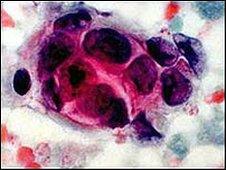Men with faulty gene 'carry breast cancer risk'
- Published

The gene increases the risk of breast cancer
Men who carry a faulty gene have a one in 15 chance of getting breast cancer by the time they are 70, a study says.
The figure was put forward by researchers from St Mary's Hospital in Manchester who analysed 321 families with the BRCA2 gene.
The faulty gene causes hundreds of UK cases of breast cancer in women every year, and can be passed on to both sexes through the generations.
But experts said breast cancer in men was still very rare.
There are about 300 cases in Britain each year compared with more than 45,000 among women.
The research, published in the Journal of Medical Genetics, involved data from families with the faulty BRCA2 gene living in and around Manchester and Birmingham.
Among the families, 16 men who were first degree relatives of known BRCA2 carriers had developed breast cancer between the ages of 29 and 79. Another eight cases occurred in second degree relatives.
Analysis showed the risk of breast cancer among men with a faulty BRCA2 gene was 7.1% by the age of 70 and 8.4% by the age of 80.
Lead researcher Prof Gareth Evans, from St Mary's Hospital in Manchester said: "There is a one in 1,000 chance of developing breast cancer as a man in the general population.
"Men don't have to have a faulty copy of BRCA2 to get breast cancer, but the highest risk for men is if they have a faulty copy of the gene."
But he added it was important for men who know they have the gene or who are from a family with a history of carrying the gene to be aware of the risk.
Nell Barrie, from Cancer Research UK, said: "Most men who have a relative with breast cancer will not be at an increased risk of developing it.
"This study looked only at men who carry a very specific faulty gene and the numbers of men who carry this gene are likely to be small.
"If a man has a very strong family history of breast cancer and is worried about his risk he should discuss it with his doctor."